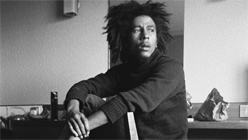In the three decades since his 1981 death from cancer, Bob Marley’s legacy has only grown. His recordings still dominate reggae sales charts, and his face is still emblazoned on T-shirts and dorm-room walls — an image as ubiquitous and iconic as Che Guevara, with less militant or overtly political connotations.
But for all that cultural omnipresence, there has never been a major documentary on the life of the musician; his family has always maintained strict control over access to the music and archival materials necessary to such a film. That changes with Marley, a family-approved project initially earmarked for Martin Scorsese, then for Jonathan Demme, and finally brought to fruition by director Kevin Macdonald.
Given that the access granted here is a rare exception, this film is likely to remain a singular and definitive document of Marley’s life, and that’s reflected in Macdonald’s approach, which is rigorously straightforward and traditional. This is largely a chronological birth-to-death journey, filled with the requisite interviews with friends and family, archival concert footage, the Ken Burns-ing of still photographs from throughout Marley’s life, and the constant beat of his music keeping time in the background.
That music isn’t just literally in the background, on the soundtrack; it takes a back seat thematically, too. Macdonald never really feels the need to concentrate too closely on specific songs, albums or the stylistic shifts that marked Marley’s career. Beyond some discussion from former band member Bunny Wailer — one of the film’s most frequent and colorful interview subjects — about the important transition from the band’s early ska work to the rock-inflected reggae that made Marley an international superstar, the music remains secondary.
That ends up being a wise choice: Even at a running time of nearly 2 1/2 hours, everything here feels essential to telling this story. Details of a lengthy discography — the one aspect of his life already in the public consciousness — would only serve as clutter.


